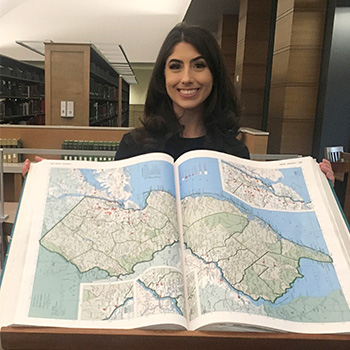Rebecca Howard '18
travel through time.
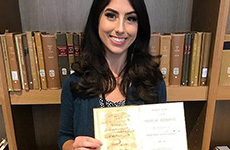
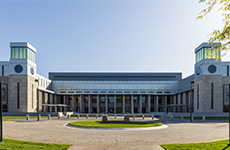
Rebecca Howard has fond memories of her time here at Stockton four years ago. Read on to see how choosing Stockton prepared her to keep travelling through time.
What does your typical day-to-day look like?
I work at the Tennessee State Library and Archives in Digital Services where we digitize physical materials and make them available through our virtual archive. We then create metadata from those documents and so that they are easily findable and accessible.
For example, we’re currently working on a collection called Looking Back at Tennessee that consists of photo negatives. Usually, they are held in the historic vault and patrons would have to visit in person to view them. These negatives are important because they really showcase the everyday life of people, particularly those in rural areas, in Tennessee. We’re also working on digitizing our collection of governor’s letters, starting from the first governor, John Sevier. We will soon have a team of volunteers transcribing those letters, so they can also be easily readable online.
Rebecca Howard (2018)
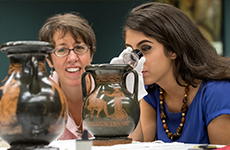
Why did you choose Stockton?
I chose Stockton because of the friendly and peaceful atmosphere. The professors are very devoted to your education and the overall mood of the campus is extremely comforting.
Why did you choose your major?
I chose Historical Studies as my major because it is the only subject I've ever wanted to study. Being able to draw connections from the past and understand how we got to where we are today is important to me. It is also a great background for my desired career path of being a librarian.
What are your career goals?
Currently, I am seeking to apply to a master's degree in a Library Sciences program.
Can you describe your work with Black in Appalachia?
Following my tenure as a research and teaching assistant at the University of Tennessee, I worked with different organizations and libraries including East Tennessee PBS’s Black in Appalachia, a Black history project that is community-based. We would organize community history days in which people could bring historical photographs and documents in for scanning, and my colleague would record oral histories. We ensured families got the original copies back along with a copy of the digitized files, and with that, we created an archive dedicated to everyday life in Black communities in Appalachia, a population that is underserved and underrepresented, especially in the archive world. We owed everything to the community and their commitment to helping us preserve their history.
I was hired by the Tennessee State Library and Archives and started early March of 2020. I was only there for about two weeks before we were working from home full time for several months. At the time I was working in Public Services, in which we worked directly with patrons assisting them with their research. Even before working in Digital Services, I understood the importance of having collections accessible remotely when possible. It’s still important now with the fact that travel and gas are only becoming more expensive. Although we are now beginning to host more in-person meetings and conferences, I think it’s important to continue to move forward with caution and transparency in relation to COVID-19, even as we’re returning to “normal”.
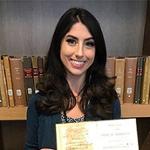
Her opinion on working during COVID-19 and accessibility
What is your next goal? Do you see yourself coming back to the nest or another university for graduate school?
In this field, post-graduate education is common. I attended graduate school at the University of Tennessee and earned my Master of Science in Information Sciences. I very fortunately received an assistantship which funded my graduate education. I’ve thought about possibly pursuing a second master’s or a doctorate, but I think I’m content where I am right now within my field.
What advice would you give students who are interested in Historical Studies? Are you open to mentoring students currently in the program?
I would say to go for it; people will try to tell you that a degree in History or in other humanities isn’t worth it, but if it’s something that you really want to do, you should go after it.
I would also say to try to get as much experience as you can in any waythat you can. At Stockton University, I volunteered in the Special Collections Library with Heather [Perez] and worked at the Atlantic County Library System. Getting your foot in the door of the field is super important and will take you a long way.
As for mentoring students in the program, I would love to provide insight or advice to pursuing an education and career in the history field.
